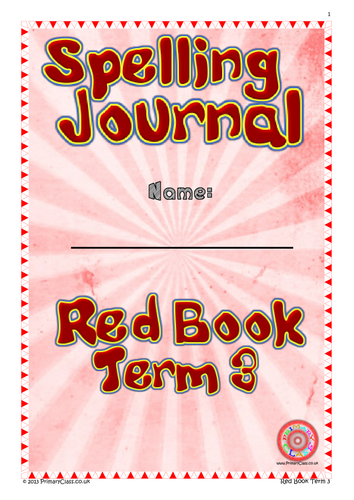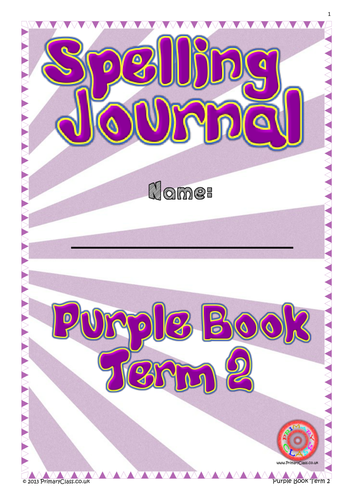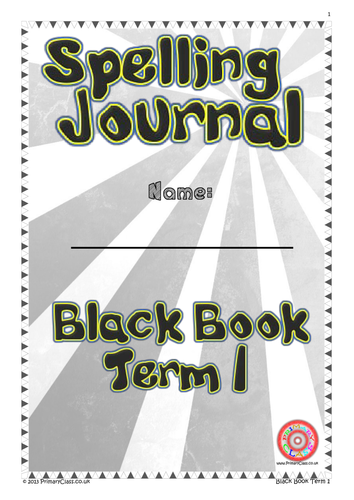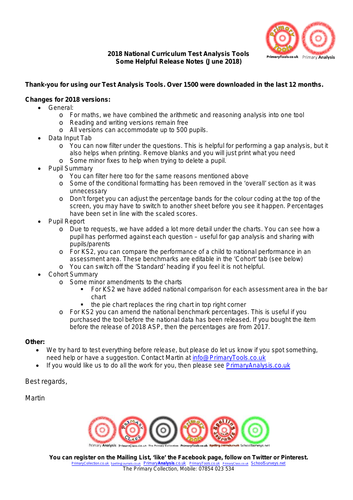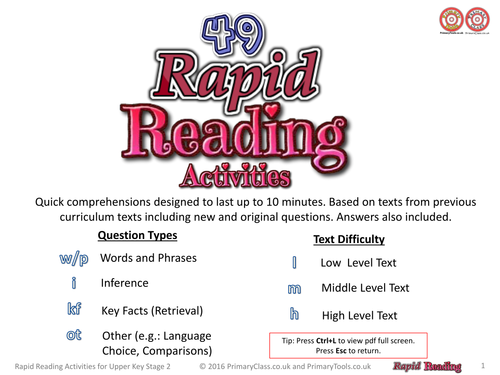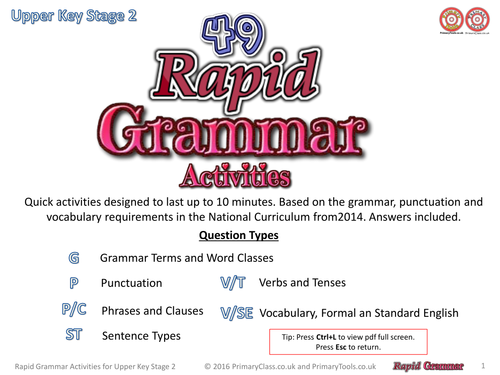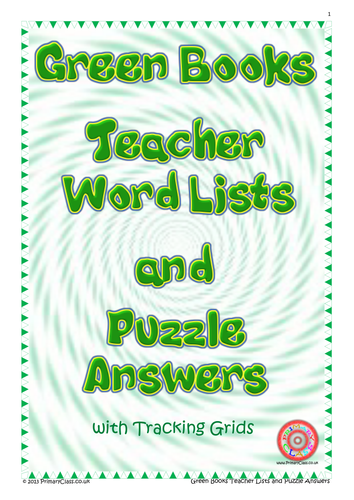
284Uploads
2081k+Views
2046k+Downloads
All resources

2024 KS1 Mathematics Question Level Analysis
2024 KS1 Mathematics Question Level Analysis
Requires Excel with macros enabled.
Instant download after purchase. Maximum of 5 downloads.
Please note sample pictures are for the KS2 Mathematics Analysis.
Summary of Features (please note some features may not be available depending on the test type):
Pupil Summary shows total marks for each paper, number of questions unanswered (possibly indicating need to increase pace), number of incorrect answers, total overall score (and percent), total score in each strand. Option to adjust the colour thresholds to make it easier to spot patterns and gaps.
Pupil Reports show a summary of performance in each strand for an individual pupils. Available in 2016 versions and later. Useful for feeding back to pupils, parents and informing intervention teachers.
Contextual Analysis (2019 versions onwards) shows a breakdown by key groups (gender, SEND status, disadvantaged, EAL) plus up to four custom groups. Compares school data (grades and scaled scores) to national data in a detailed but user-friendly report.
Cohort Summary shows an overview of the cohort against each strand. This is also compared to national data where it is available. This page gives a summary of attainment including number and percent at expected and higher standard.
Strand Summary shows a the weighting of each strand and the performance within it. For example, in a grammar test a cohort may perform poorly in identifying sentence types and equally poorly in identifying punctuation. However as there is more weighting given to punctuation, it would be advisable to focus on this area.
Other Charts Charts which show performance for each question, organised by most correct to incorrect, by strand and also by year group question (for mathematics). The most powerful chart orders questions from most correct to incorrect enabling you to see precisely where there are strengths and weaknesses.
2024 KS1 Mathematics Question Level Analysis (SATs)

2023 KS1 SATs Mathematics Test and Question Level Analysis
2023 KS1 Mathematics Test and Question Level Analysis
Requires Excel with macros enabled.
Summary of Features (please note some features may not be available depending on the test type):
Pupil Summary shows total marks for each paper, number of questions unanswered (possibly indicating need to increase pace), number of incorrect answers, total overall score (and percent), total score in each strand. Option to adjust the colour thresholds to make it easier to spot patterns and gaps.
Pupil Reports show a summary of performance in each strand and per question for an individual pupils. Useful for feeding back to pupils, parents and informing intervention teachers.
Contextual Analysis shows a breakdown by key groups (gender, SEND status, disadvantaged, EAL) plus up to four custom groups. Compares school data (grades and scaled scores) to national data in a detailed but user-friendly report.
Cohort Summary shows an overview of the cohort against each strand. This is also compared to national data where it is available. This page gives a summary of attainment including number and percent at expected and higher standard.
Strand Summary shows a the weighting of each strand and the performance within it. For example, in a grammar test a cohort may perform poorly in identifying sentence types and equally poorly in identifying punctuation. However as there is more weighting given to punctuation, it would be advisable to focus on this area.
Other Charts Charts which show performance for each question, organised by most correct to incorrect, by strand and also by year group question (for mathematics). The most powerful chart orders questions from most correct to incorrect enabling you to see precisely where there are strengths and weaknesses.

2019 KS2 Grammar, Punctuation & Spelling Test and Question Level Analysis
Summary of Features (please note some features may not be available depending on the test type):
Pupil Summary shows total marks for each paper, number of questions unanswered (possibly indicating need to increase pace), number of incorrect answers, total overall score (and percent), total score in each strand. Option to adjust the colour thresholds to make it easier to spot patterns and gaps.
Pupil Reports show a summary of performance in each strand for an individual pupils. Available in 2017 versions and later excluding reading. 2018 versions and later contain detailed feedback on each question. Useful for feeding back to pupils, parents and informing intervention teachers.
Cohort Summary shows an overview of the cohort against each strand. This is also compared to national data where it is available. This page gives a summary of attainment including number and percent at expected and higher standard.
Strand Summary shows a the weighting of each strand and the performance within it. For example, in a grammar test a cohort may perform poorly in identifying sentence types and equally poorly in identifying punctuation. However as there is more weighting given to punctuation, it would be advisable to focus on this area.
Other Charts Charts which show performance for each question, organised by most correct to incorrect, by strand and also by year group question (for mathematics). The most powerful chart orders questions from most correct to incorrect enabling you to see precisely where there are strengths and weaknesses.

2022 KS1 SATs Mathematics Test and Question Level Analysis
2022 KS1 Mathematics Test and Question Level Analysis
Requires Excel with macros enabled.
Summary of Features (please note some features may not be available depending on the test type):
Pupil Summary shows total marks for each paper, number of questions unanswered (possibly indicating need to increase pace), number of incorrect answers, total overall score (and percent), total score in each strand. Option to adjust the colour thresholds to make it easier to spot patterns and gaps.
Pupil Reports show a summary of performance in each strand and per question for an individual pupils. Useful for feeding back to pupils, parents and informing intervention teachers.
Contextual Analysis shows a breakdown by key groups (gender, SEND status, disadvantaged, EAL) plus up to four custom groups. Compares school data (grades and scaled scores) to national data in a detailed but user-friendly report.
Cohort Summary shows an overview of the cohort against each strand. This is also compared to national data where it is available. This page gives a summary of attainment including number and percent at expected and higher standard.
Strand Summary shows a the weighting of each strand and the performance within it. For example, in a grammar test a cohort may perform poorly in identifying sentence types and equally poorly in identifying punctuation. However as there is more weighting given to punctuation, it would be advisable to focus on this area.
Other Charts Charts which show performance for each question, organised by most correct to incorrect, by strand and also by year group question (for mathematics). The most powerful chart orders questions from most correct to incorrect enabling you to see precisely where there are strengths and weaknesses.

Spelling Journal - Red Book Term 3 - Year 3/4 (Age 7-9) National Curriculum 2014
Spelling Journal - Red Book Term 3 - Year 3/4 (Age 7-9) National Curriculum 2014
Term 3 of 3
Based on the Primary Curriculum for English 2014. Separated into 10 weeks, 10 words per week. Each week includes themed word list, practice space, word search and anagrams. Notes and contents page also included as are rule explanations as appropriate. Printing as a booklet recommended to produce an A5 size book. Requires a pdf reader
Other levels and teacher books available: https://www.tes.com/teaching-resources/shop/primaryclass

2024 KS2 SATs Grammar, Punctuation & Spelling Test and Question Level Analysis
Summary of Features:
Pupil Summary shows total marks for each paper, number of questions unanswered (possibly indicating need to increase pace), number of incorrect answers, total overall score (and percent), total score in each strand. Option to adjust the colour thresholds to make it easier to spot patterns and gaps. All Versions from 2016.
Pupil Reports show a summary of performance in each strand for an individual pupils. Useful for feeding back to pupils, parents and informing intervention teachers. All Versions from 2016.
Contextual Analysis shows a breakdown by key groups (gender, SEND status, disadvantaged, EAL) plus up to four custom groups. Compares school data (grades and scaled scores) to national data in a detailed but user-friendly report. All Versions from 2016.
Cohort Summary shows an overview of the cohort against each strand. This is also compared to national data where it is available. This page gives a summary of attainment including number and percent at expected and higher standard. All Versions from 2016.
Strand Summary shows a the weighting of each strand and the performance within it. For example, in a grammar test a cohort may perform poorly in identifying sentence types and equally poorly in identifying punctuation. However as there is more weighting given to punctuation, it would be advisable to focus on this area. All Versions from 2016.
Other Charts Charts which show performance for each question, organised by most correct to incorrect, by strand and also by year group question (for mathematics). The most powerful chart orders questions from most correct to incorrect enabling you to see precisely where there are strengths and weaknesses. All Versions from 2016.

Spelling Journal - Purple Book Term 2 - Year 5/6 (Age 9-11) National Curriculum 2014
Spelling Journal - Purple Book Term 2 - Year 5/6 (Age 9-11) National Curriculum 2014
Term 2 of 3
Based on the Primary Curriculum for English 2014. Separated into 10 weeks, 10 words per week. Each week includes themed word list, practice space, word search and anagrams. Notes and contents page also included as are rule explanations as appropriate. Printing as a booklet recommended to produce an A5 size book. Requires a pdf reader
Other levels and teacher books available: https://www.tes.com/teaching-resources/shop/primaryclass

Spelling Journal - Black Book Term 1 - Year 7+ (Age 11+)
Spelling Journal - Black Book Term 1 - Year 7+ (Age 11+)
Term 1 of 3
Separated into 10 weeks, 10 words per week. Each week includes themed word list, practice space, word search and anagrams. Notes and contents page also included as are rule explanations as appropriate. Printing as a booklet recommended to produce an A5 size book. Requires a pdf reader
Other year groups and teacher books available: https://www.tes.com/teaching-resources/shop/primaryclass

2018 KS2 National Curriculum (SATs) Test Analysis for Mathematics
2018 KS2 National Curriculum (SATs) Test Analysis for Mathematics.
Please see release notes for new features.
Analysis for all tests is available elsewhere on TES or form our website.

2022 KS2 Grammar, Punctuation & Spelling Test and Question Level Analysis
2022 KS2 Grammar, Punctuation & Spelling Test and Question Level Analysis
Requires Excel with macros enabled.
Summary of Features:
Questions Versus National compares the performance of your cohort against the performance of pupils nationally in each question. A powerful chart which instantly shows you which questions you are strong or weak on. As it uses national data, it considers the difficulty of each question, compares it the performance of your cohort and orders the results from strongest to weakest. 2016 to 2022 KS2 versions only, Q vs National will be added to the 2023 KS2 version at a later date.
Pupil Summary shows total marks for each paper, number of questions unanswered (possibly indicating need to increase pace), number of incorrect answers, total overall score (and percent), total score in each strand. Option to adjust the colour thresholds to make it easier to spot patterns and gaps.
Pupil Reports show a summary of performance in each strand for an individual pupils. Available in 2017 versions and later excluding reading. 2018 versions and later contain detailed feedback on each question. Useful for feeding back to pupils, parents and informing intervention teachers.
Contextual Analysis (2019 versions onwards) shows a breakdown by key groups (gender, SEND status, disadvantaged, EAL) plus up to four custom groups. Compares school data (grades and scaled scores) to national data in a detailed but user-friendly report.
Cohort Summary shows an overview of the cohort against each strand. This is also compared to national data where it is available. This page gives a summary of attainment including number and percent at expected and higher standard.
Strand Summary shows the weighting of each strand and the performance within it. For example, in a grammar test a cohort may perform poorly in identifying sentence types and equally poorly in identifying punctuation. However as there is more weighting given to punctuation, it would be advisable to focus on this area.
Other Charts Charts which show performance for each question, organised by most correct to incorrect, by strand and also by year group question (for mathematics). The most powerful chart orders questions from most correct to incorrect enabling you to see precisely where there are strengths and weaknesses.
2022 KS2 Grammar, Punctuation & Spelling Test and Question Level Analysis

2019 KS2 Mathematics Question Level Analysis
Summary of Features (please note some features may not be available depending on the test type):
Pupil Summary shows total marks for each paper, number of questions unanswered (possibly indicating need to increase pace), number of incorrect answers, total overall score (and percent), total score in each strand. Option to adjust the colour thresholds to make it easier to spot patterns and gaps.
Pupil Reports show a summary of performance in each strand for an individual pupils. Available in 2017 versions and later excluding reading. 2018 versions and later contain detailed feedback on each question. Useful for feeding back to pupils, parents and informing intervention teachers.
Cohort Summary shows an overview of the cohort against each strand. This is also compared to national data where it is available. This page gives a summary of attainment including number and percent at expected and higher standard.
Strand Summary shows a the weighting of each strand and the performance within it. For example, in a grammar test a cohort may perform poorly in identifying sentence types and equally poorly in identifying punctuation. However as there is more weighting given to punctuation, it would be advisable to focus on this area.
Other Charts Charts which show performance for each question, organised by most correct to incorrect, by strand and also by year group question (for mathematics). The most powerful chart orders questions from most correct to incorrect enabling you to see precisely where there are strengths and weaknesses.

Rapid Reading - 49 Quick Reading Activities for Upper Key Stage 2
Quick comprehensions designed to last up to 10 minutes. Based on texts from previous curriculum texts including new and original questions. Answers also included.
3 different levels of text
Categorised questions
Sample file can be found here:
https://www.tes.com/teaching-resource/rapid-reading-49-quick-reading-activities-for-upper-key-stage-2-11222572

Rapid Grammar - 49 Quick Grammar, Punctuation and Vocabulary Activities for Upper Key Stage 2
Rapid Grammar - 49 Quick Grammar, Punctuation and Vocabulary Activities for Upper Key Stage 2
Quick activities designed to last up to 10 minutes. Based on the 2016 test framework for grammar in Key Stage 2. Includes new and original questions.
Categorised questions.
Answers also included.
Sample file containing 3 of the 49 activities can be found here:
https://www.tes.com/teaching-resource/rapid-grammar-49-quick-grammar-punctuation-and-vocabulary-activities-for-upper-key-stage-2-11223951

Rapid Reading - 50 Quick Reading Activities for Key Stage 1
Quick comprehensions designed to last up to 10 minutes.
• Based on texts from previous curriculum tests
• Includes new and original questions.
• Great for homework, whole class or independent learning
• 3 different levels of text
• Categorised questions
• Answers included.

Rapid Reading - 48 Quick Reading Activities for Lower Key Stage 2
Quick comprehensions designed to last up to 10 minutes. Based on texts from previous curriculum tests including new and original questions. Answers also included.
3 different levels of text
Categorised questions

Rapid Arithmetic - 48 Rapid Arithmetic Activities for Upper Key Stage 2
48 Quick Arithmetic activities for Upper Key Stage 2
Quick activities designed to last up to 10 minutes. Based on the 2016 test frameworks and arithmetic requirements in the National Curriculum from 2014.
Includes new and original questions
Categorised questions
Answers included.
Sample file can be found here including 3 of the 48 activities:
https://www.tes.com/teaching-resource/rapid-arithmetic-48-quick-arithmetic-activities-for-upper-key-stage-2-11251826

Rapid Arithmetic for Lower Key Stage 2
48 activities designed to last up to 10 minutes for Lower Key Stage 2
Based on the 2016 test frameworks and arithmetic requirements in the National Curriculum from 2014.
Includes:
-New and original questions
-Categorised questions
-Answers.

Rapid Grammar for Lower Key Stage 2 - 49 quick activities based on the National Curriculum
49 Quick Grammar, Punctuation and Vocabulary activities for Lower Key Stage 2
Quick activities designed to last up to 10 minutes. Based on the requirements of the National Curriculum.
Includes all new categorised questions, with answers included.
Great for homework, independent learning or whole class teaching.

Spelling Journals - Green Set - Year 1 - Teacher Book
Green set (Year 1) Teacher Book - Term 1 to 3 Teacher Spelling Lists, Tracking Grids and Puzzle Answers
Requires a pdf reader.
Other levels and teacher books available: https://www.tes.com/teaching-resources/shop/primaryclass

2024 KS2 SATs Mathematics Test and Question Level Analysis
2024 KS2 Mathematics Test and Question Level Analysis
Requires Excel with macros enabled.
Summary of Features
Pupil Summary shows total marks for each paper, number of questions unanswered (possibly indicating need to increase pace), number of incorrect answers, total overall score (and percent), total score in each strand. Option to adjust the colour thresholds to make it easier to spot patterns and gaps. All Versions from 2016.
Pupil Reports show a summary of performance in each strand for an individual pupils. Useful for feeding back to pupils, parents and informing intervention teachers. All Versions from 2016.
Contextual Analysis shows a breakdown by key groups (gender, SEND status, disadvantaged, EAL) plus up to four custom groups. Compares school data (grades and scaled scores) to national data in a detailed but user-friendly report. All Versions from 2016.
Cohort Summary shows an overview of the cohort against each strand. This is also compared to national data where it is available. This page gives a summary of attainment including number and percent at expected and higher standard. All Versions from 2016.
Strand Summary shows a the weighting of each strand and the performance within it. For example, in a grammar test a cohort may perform poorly in identifying sentence types and equally poorly in identifying punctuation. However as there is more weighting given to punctuation, it would be advisable to focus on this area. All Versions from 2016.
Other Charts Charts which show performance for each question, organised by most correct to incorrect, by strand and also by year group question (for mathematics). The most powerful chart orders questions from most correct to incorrect enabling you to see precisely where there are strengths and weaknesses. All Versions from 2016.





